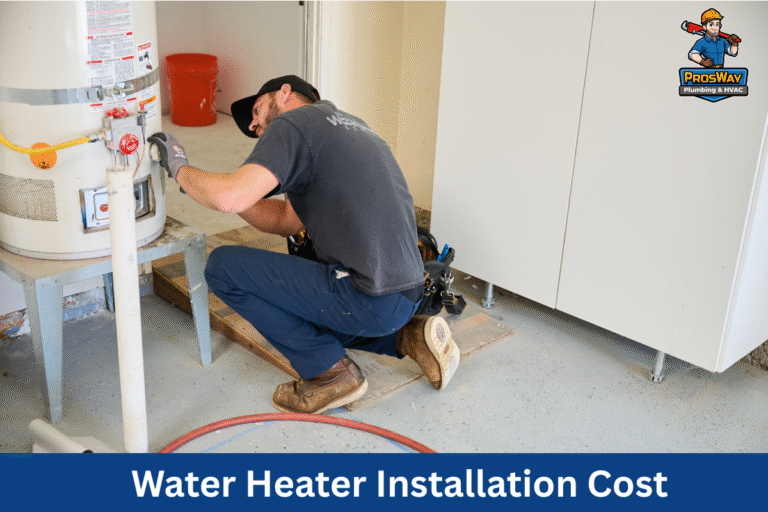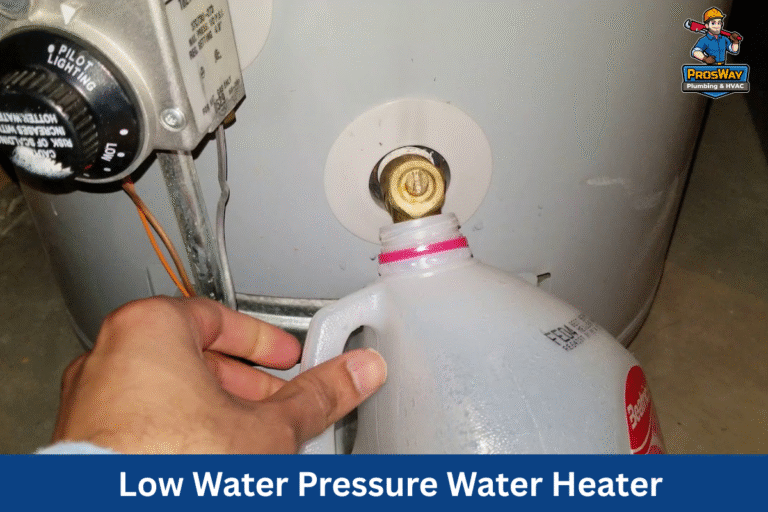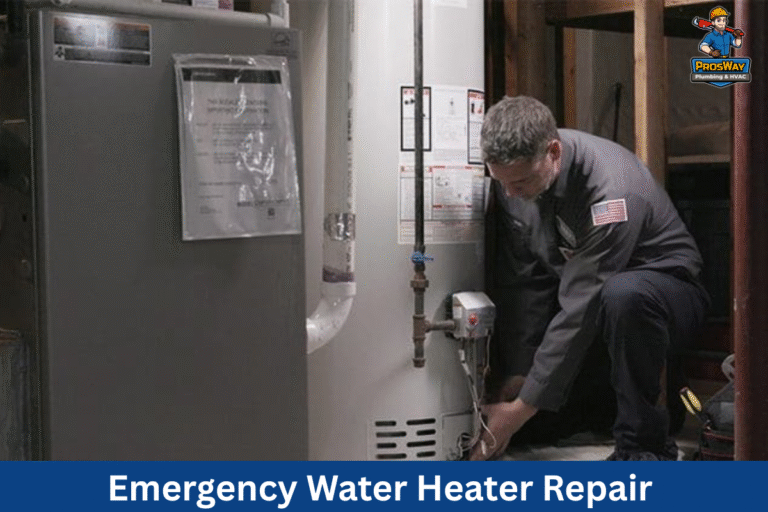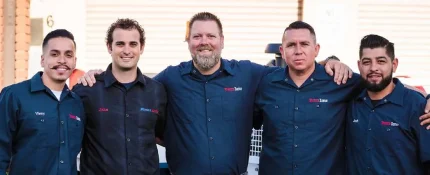At ProsWay Plumbing & HVAC in Northern New Jersey, I’ve seen many homeowners caught off guard by the expenses of sewer line repairs. Most focus only on the upfront repair fee, but often hidden costs quickly add up.
This article explains the fee structure for sewer line repairs and breaks down the repair components, additional inspection costs, permit fees, and administrative charges contributing to the total price. As you read on, you will learn how various factors, such as additional labor, unplanned material replacements, and regional permit differences, affect your final costs.
Key Takeaways
- Hidden sewer line repair costs arise from extra inspections, unplanned labor, material upgrades, and emergency intervention fees.
- Detailed written estimates and clear contracts mitigate unexpected charges.
- Regional permit fees and municipal regulations vary widely and can add significantly to the repair cost.
- Coordinating with local agencies and having a contingency budget is essential for managing unforeseen expenses.
- Proactive maintenance and multiple competitive quotes help reduce the overall financial impact of sewer repairs.
What Are the Typical Expenses for Sewer Line Repairs?
The fee structure for sewer line repairs consists of several standard components that contribute to the overall cost. In my practice, I always begin by evaluating the job’s complexity and assessing the necessary techniques.
A typical sewer line repair fee covers a variety of elements. Firstly, the standard repair components include labor costs, equipment rental such as trenchers and pumps, and material costs from pipe replacement to sealants.
Next, inspection fees are part of the process, especially when dye tests or CCTV surveys are needed to assess the integrity of the line. In many cases, if repairs involve working under difficult soil conditions or near easements, additional charges may be incurred.
Why Do Expenses in Sewer Line Repairs Vary?
Several factors uniquely influence the variance in repair fees. For example, accessibility issues such as the location of the sewer lateral near a fence or a driveway may require additional labor and special equipment.
The type of soil—clay versus sandy soil—also plays a role, as harder soils require more intensive work. The length of the repair, or if the work requires a pipe bursting technique, can significantly increase costs.
In some cases, regional factors such as local permit fees and additional insurance may add a premium. Credit checks or documentation may be required if you are working with certain contractors, further influencing the variances.
In essence, each repair job is tailored to its unique working conditions, which can lead to substantial differences between similar jobs in different areas.
Time Requirements and Labor Inputs
Time and labor are critical elements that drive up sewer line repair fees. In many repairs, the labor involved is not just the on-site work but also includes pre-repair assessments and post-repair cleanup and testing.
I have seen jobs where unexpected delays due to adverse weather, unanticipated soil conditions, or the need for additional manhole excavation have added hours to a repair job. If the repair team has to work after hours, you may encounter overtime charges.
This combination of unforeseen delays and intensive labor inputs frequently accounts for a significant portion of the repair bill. Understanding these dynamics can help demystify the cost structure for homeowners facing repairs.
Permit, Regulatory, and Administrative Charges
Permits and administrative fees form another set of hidden expenses in sewer line repairs. Municipalities and local jurisdictions often impose permit fees based on the project’s scale and the type of repair being performed.
For example, in Northern New Jersey, obtaining a permit can sometimes involve additional requirements, such as coordinating with local agencies or paying for extra assessments. These fees may also include inspection costs or additional documentation processing fees.
In some cases, you might find that the sewer line contractor has added an expense line for regulatory compliance, which covers costs related to meeting specific federal or state environmental standards, such as wastewater discharge management or stormwater controls.
The total cost may even include charges related to severance from easement spaces or accessibility modifications needed during the repair. Knowing how permits and regulations affect your project can better prepare you for the final invoice.
What Hidden Charges Can Appear in Sewer Repairs?

Even after careful estimates, many homeowners are caught off guard by unseen charges that emerge during sewer line repairs. These extra fees are often only discovered during or after the repair process.
Hidden or unadvertised costs may cover necessary extra inspections, unplanned labor occurrences, or material upgrades that weren’t initially considered. In my career, I have encountered situations where an initial written estimate did not account for a minor but critical component.
Such as unexpected soil contamination requiring additional trenching work. Recognizing these unseen charges early on can help you tackle them without disrupting your overall repair budget.
Extra Inspection Expenses
Unexpected inspection fees are common during sewer repairs. Often, a routine CCTV inspection or dye test is planned during the assessment phase. However, if the sewer line reveals further deterioration, additional inspections become necessary.
These may include multiple dye tests or even specialized inspections by environmental experts. For example, if a crack is found during the municipality might require a second comprehensive inspection, adding extra fees to your already complex repair job.
That’s when the expenses in sewer line repairs can rise unexpectedly, especially if environmental specialists or advanced diagnostics are brought in to meet regulatory standards.
How Do Labor Surprises Affect Costs?
During repair jobs, unplanned labor occurrences are one of the major contributors to hidden costs. This might happen when the work site reveals complications that were not visible during the initial consultation.
For instance, an area presumed to be a simple repair might later require additional excavation because of a collapsed pipe section. Such unplanned labor events involve hiring additional crew members or specialized operators.
These unforeseen expenditures make it crucial for homeowners to factor in contingency funds when planning for repairs.
Fees for Emergency Interventions and Traffic Management
Sewer repairs sometimes occur under emergency conditions, which can lead to a premium price. When unexpected failures occur, rapid intervention is necessary to prevent further property damage or public health hazards.
Emergency repair services might demand expedited servicing, leading to additional service call fees. Moreover, if the repair requires managing traffic by cordoning off public roads, additional fees for traffic management are imposed by the local council.
These fees cover the cost of safety personnel and potential fines for temporary roadway closures. As a result, homeowners facing emergency repairs need to be prepared for higher fees due to both the urgency and the additional administrative burden.
Why Do Permits and Inspections Affect Sewer Repair Costs?
Permit and inspection expenses can contribute significantly to the overall sewer line repair bills. Regulatory compliance is critical, and local authorities impose various charges based on the complexity of the repair assessments.
In jurisdictions like Northern New Jersey, permit fees vary widely, and it is not uncommon for homeowners to face charges that seem disproportionate to the initial repair estimate. These fees were meant to ensure proper oversight and safety.
Where Do Permit Fees Vary Most?
Permit fee differences vary significantly based on the municipality or county where the repair is taking place. Even within a single state like New Jersey, local governments have different fee structures and processing charges.
For example, a repair project in a densely populated urban area may incur higher permit fees due to stricter inspection requirements and increased administrative overhead.
Conversely, repairs in less-regulated rural areas might be less expensive in terms of permit costs. It is essential to check with your local building department to understand the specific fee expectations.
Documentation and Processing Fee Nuances
Documentation fees are another frequently overlooked expense during sewer repairs. When applying for permits, contractors may need to produce detailed project documentation. This includes site surveys, engineering reports, and certification forms.
Processing these documents requires significant administrative work, and local governments often impose a fee per document or application cycle.
For example, a sewer repair permit might include multiple documentation aspects such as a certificate of occupancy, dye tests, and inspection reports. This administrative overhead is critical for ensuring that the repair work complies with state and federal guidelines.
As your contractor submits these records, the associated admin charges quietly increase the expenses in sewer line repairs, even before a shovel hits the ground.
Why Do Sewer Repair Bills Often Exceed Estimates?
After receiving an initial estimate for a sewer line repair, many homeowners are surprised by discrepancies between the quoted amount and the final invoice.
These differences often arise due to changes in the scope of work, unforeseen issues, or additional fees that were not communicated at the outset.
In my experience, detailed written estimates are vital. However, even the most detailed quotes cannot always account for every eventuality encountered during repair.
When Do Quote and Invoice Differences Occur?
Initial quotes are frequently based on standard repair components and assumed conditions. When the repair work begins, contractors may uncover hidden issues that were not visible during the preliminary inspection.
Variations may include additional excavation due to collapsed pipe sections, higher-than-expected material replacement, or extra labor for managing emergency repairs.
These unexpected developments cause the expenses in sewer line repairs to rise beyond what was originally anticipated. A detailed estimate with conditional clauses helps homeowners prepare for these common shifts in cost.
Indicators of Potential Billing Irregularities
Some warning signs may indicate that there will be discrepancies between the estimate and final billing. For instance, if the initial quote is vague or if it lacks a thorough breakdown of labor, materials, and permit fees, it might be a red flag.
Additionally, contractors who do not provide a written quote or who seem reluctant to discuss potential extras should be approached with caution. Always request a detailed bid, and if possible, compare multiple quotes.
Being aware of these indicators can save you from unforeseen financial stress and help you negotiate a better deal before work begins.
How Can You Manage Unexpected Repair Costs?
Managing additional repair expenses requires a proactive approach. In my work across Northern New Jersey, I advise homeowners to adopt strategies that minimize unexpected costs during sewer line repairs.
Preventive maintenance is key, as routine checks and regular cleaning can prevent minor issues from escalating into major repair jobs.
Furthermore, obtaining multiple competitive quotes allows you to compare prices and services, which can lead to cost savings. This section details some effective strategies for managing these repair expenses.
Why Is Routine Maintenance So Effective?
Routine maintenance plays a significant role in preventing costly sewer line repairs. Regular inspections, cleanouts, and preventive dye tests can reveal early signs of deterioration before they develop into more serious issues.
By investing in routine maintenance services—commonly offered by companies like ProsWay Plumbing & HVAC—you can catch problems early and perform timely repairs.
You can watch this video, Easiest way to clear a sewer blockage.
This proactive approach limits emergency repairs and costly replacement fees. Homeowners should keep a maintenance log and schedule annual inspections to reduce the risk of hidden charges.
Budget Planning for Unforeseen Expenses
It is critical to include an emergency buffer when budgeting for sewer line repairs. Unforeseen costs such as unplanned labor, additional material needs, or extra permit fees can quickly escalate the total bill.
I recommend setting aside at least 20% above your initial estimate as a contingency fund. This financial cushion allows you to cover unexpected charges without compromising your entire repair project.
Additionally, discussing budget limits with your contractor can help adjust the scope of work early on, ensuring that your final costs remain within a manageable range.
When Do Proactive Measures Pay Off?
Taking a proactive approach to sewer line maintenance yields significant long-term benefits. Regular upkeep not only reduces the likelihood of sudden failures but also improves the overall property value.
A well-maintained sewer system ensures efficient wastewater management, minimizes the risks of backups, and prevents structural damage to your property. Over time, this approach saves money by reducing emergency repair costs.
For homeowners in Northern New Jersey, where municipal regulations can often result in higher permit and inspection fees, adopting a long-term care strategy is essential. By consistently investing in maintenance, you build a robust infrastructure.
Why Do Final Bills Differ from Initial Estimates?

Discrepancies between initial estimates and final bills are common in sewer line repairs, causing frustration for many homeowners. In my experience, such discrepancies usually stem from unforeseen issues that arise during the repair process.
These differences underscore the importance of detailed, written estimates and transparent communication with your contractor. Below, I offer answers to some frequently asked questions based on real-world experiences and documented cases.
What Should a Written Estimate Include?
A detailed written estimate should include clear items for labor, materials, permits, and contingency fees. For example, in my contracts, I include a section that outlines potential additional costs if unanticipated issues occur.
Detailed estimates prevent disputes later and allow homeowners to set aside a contingency budget. They also provide evidence in case of any billing discrepancies, which helps ensure that all parties adhere to the agreed-upon terms.
How Can You Spot Signs of Billing Irregularities?
Some red flags include vague quotes without itemized details and contractors unwilling to discuss potential overruns. If discrepancies arise between the initial quote and the final bill, ask your contractor for a detailed explanation of each extra charge.
Comparing multiple estimates can also help identify irregularities. Understanding these indicators builds confidence and sets accurate expectations from the beginning.
This table highlights typical areas of discrepancy and how they affect the final bill. By comparing quotes line by line, homeowners can better negotiate and understand future repairs.
| Aspect | Initial Quote | Final Bill | Discrepancy Analysis |
|---|---|---|---|
| Labor Hours | 10 hours | 15 hours | Unplanned delays increased labor costs |
| Material Costs | $500 | $800 | Additional pipe replacement needed |
| Permit Fees | $200 | $250 | Extra documentation required |
| Inspection Costs | $100 | $150 | Additional inspections mandated |
| Emergency Fees | $0 | $300 | After-hours service required |
Frequently Asked Questions
To prepare, request a comprehensive written estimate that includes potential contingency fees. Regular maintenance and multiple contractor quotes can minimize unexpected costs. Discuss permit and inspection fees upfront.
What steps should I take if my final bill is much higher than the estimated quote?
Begin by reviewing the itemized bill and comparing it with your initial quote. Ask the contractor for detailed explanations of extra charges, and refer to your contract. It may help to get a second opinion from another service provider.
Are emergency repair fees always higher than standard repairs?
Yes, emergency repairs typically incur additional fees due to urgent mobilization, after-hours work, and expedited service requirements. These extra costs are necessary for quick intervention, but should be explained in advance by your contractor.
Absolutely. By discussing and understanding the fee breakdown upfront, you can negotiate terms. Requesting detailed documentation and comparing multiple quotes helps you identify areas for negotiation.
Do insurance policies typically cover unexpected sewer repair expenses?
Some policies may cover repairs caused by sudden damage. Check your insurance documents for specifics on sewer line repairs and consider warranty options from reputable contractors.
Final Thoughts
From permit fees and emergency service charges to unforeseen labor and inspection costs, it’s clear that many factors influence the final bill. By educating yourself and working with a transparent contractor, you can plan and reduce surprise expenses in sewer line repairs. ProsWay Plumbing & HVAC is here to help Northern New Jersey homeowners take control of their repair costs—with clarity, reliability, and expert care.
Know What to Expect Before You Dig, Call ProsWay!
Avoid hidden fees and last-minute surprises—Call us now at (862) 260-5870 or Book Online. We’ll give you honest pricing and expert guidance so you can plan with confidence. Serving homes across Northern New Jersey with trusted, professional service. Our licensed team handles everything from permits to clean-up, so you don’t have to stress. Appointments fill up fast—secure your spot today and protect your property from costly sewer issues.








